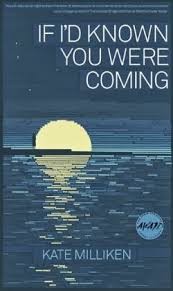
There's no reason you would know the excellent short stories by the writer Kate Milliken, Not unless you'd been watching her success with publication of her stand-out spooky stories in any number of literary journals, been her fiction-writing student or followed the annual writing prizes awarded by the University of Iowa. Come to think of it, clever literary types as you readers of OC Bookly, everybody's favorite OC books and reading blog, might indeed have plenty of reasons to already know and admire her work. But there are plenty more reasons – twelve in fact – and they are each and every one of the absolutely gorgeous short and longer stories in her collection, winner of the 2013 John Simmons Short Fiction Award titled, wryly, ominously, perfectly, If I'd Known You Were Coming.
]

Don't let the title fool you. By which I mean that you are invited to be fooled, dragooned by the stark, edgy, dark template of absence and emotional, real betrayal and loss. Nobody in Milliken's world would have baked you a cake! Which is to say that the sun on the cover may be setting or the moon rising, but either makes a nifty silhouette, juxtaposition, contrast being the controlling trope, metaphor, dynamic. That's the beautiful tension constructed in almost every one of the very short-short or traditionally longer stories, a duality-world in which people never do come, or when they do arrive are so incomplete, so wounded as to make you wonder who, what you are dealing with. The opening story is built on a modestly suspenseful, anticipation-filled premise, the plot less important than the psychic and existential set-up. A successful actor (watch out, because, well, if you know he is coming you just know there's going to be trouble!) is supposed to visit his less-famous, less-successful Hollywood pals, though they live in Calabasas. It means a lot to them, not much to this sad, incomplete, perhaps even transgressing fellow, and the implications of assumed or implied misbehavior and misunderstanding set the tone for the rest of the stories.
The characters, mostly close third person point-of-viewers, are largely women and young women and girls, with the mothers mostly unfit, in a world where that is both so incredibly obvious yet purposefully ignored, assumed. It is in the elaboration, narratives, dialog and description — all of which build to intimate characterization — that we are taken in nearly every story hereto what I will call, crudely perhaps, a killer line or situation in which all that we guessed at or was intimated is either affirmed or further complicated. After that first one you look for it, but then forget about it. And then there it is.
In the story “Inheritance,” from which the title is taken, a puzzled young man — perhaps stand-in for the reader — assesses the archetypal or arch-Millikenal girl-woman: “He'd understood these girls, the look on their faces, how they wanted something already gone.” Enviable line, sure, but also a nice posing of the problem of how much empathy is needed, and how much anybody can stand.
There is a word people sometimes use to avoid a scientific or critical breakdown or explication of art, and meant to praise it. Alchemy. I could take apart the short story “Everything Looks Beautiful,” but I would rather, out of humility and admiration, apply that noun by way of celebrating its composition. It is, friends, a perfect story. Built around a real-life tragedy which Southern Californians will recognize, it elaborates on what was fact with imagined consequences and details so close and yet so far away from the farmer's market senior citizen driver accident that you have to go back to reread it to be amazed at how an artist of fiction can blend reality into, no, bend it, to her own goals.
The other story scenarios, all so real in their elevation of the quotidian, of details, similarly lead us to killer lines while building their rhythm to assume a cruel obviousness that is taken for granted, or assumed, and then revealed or complicated. Lost children, crazy mothers, girls estranged from both, everybody here is a player in stories which are much, much bigger yet shaped by what is not there at all.

But if you want to take something apart because it is fun, or only because you want to make sure you got it, take apart the longer short story “Parts of a Boat,” whose title of course suggests an invitation to do that, to trump story and expectations, to go so much deeper than most people and characters are asked to. It is, for you keeping track at home, a Carver-type story, which is to say it is something like the famous one, “What We Talk About…,” about telling and about perspective. It is about love and about pain, and it takes place on a sailboat with a woman protagonist, a young and still desirable widow and mother who is out at sea with people who don't deserve her. Or maybe they do, in that other way. Because Milliken's own storytelling is so elegantly, effortlessly flowing, because its emotional logic is so present, our heroine Catherine's place in it is almost obscured, if so present that when it is her turn to tell a story, well, it's a miracle that boat can still float. But it does, and this time, in one of what I take to be an almost, if not quite hopeful story.
There are ten more. A couple of them involve the same characters, interacting, which makes for lovely through-lines. There is a bad house-sitter and long-gone fatherand a bulimic half-sister, and in another savagely confused relationship story, a woman who takes advantage of someone weaker but who doesn't seem to have understood how this is wrong. This one also delivers the killer concluding line, which sneaks up on you, again. It's as though Kate Milliken has put up the stop sign well after the crash.
So much alchemy, in characterization and at sentence-level. Here's a moment, briefly, of tenderness and rapprochement between a worn-out mother and her grown, lying daughter: “Some days they could fall back toward one another, when there there was room for them to do so. Maybe this was what Josie was back for, for these moments when Miriam looked at her and they both said I'm sorry and I forgive you and I love you with only their eyes and maybe half a smile, and Josie felt seen.” There's a lot to see here, in faces and in the construction of elegant, smart short stories. I've been writing a lot of letters of recommendations the past couple of weeks, and in the instructions from the grad program or university there is always a place where the recommender is supposed to rank the applicant. I'll conclude this morning's literary letter of recommendation by ranking this collection by Kate Milliken extremely highly, and as some of the best short stories I have been lucky to find lately, right up there with Jim Gavin's excellent Middle Men.
If I'd Known You Were Coming, Kate Milliken, University of Iowa Press, 134 pgs, $17.00
Andrew Tonkovich hosts the Wednesday night literary arts program Bibliocracy Radio on KPFK 90.7 FM in Southern California.

